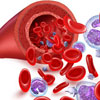Natural substance may help engraftment in umbilical cord blood transplant recipients
A therapy involving a natural compound may improve the ability of stem cells from umbilical cord blood to engraft in patients receiving a stem cell transplant for cancer or other diseases, a phase I clinical trial led by Dana-Farber Cancer Institute scientists indicates.
Details of the trial (abstract 653), which involved 12 patients who underwent reduced-intensity chemotherapy and then received a transplant of cord blood stem cells treated with the compound FT1050, have been presented at the American Society of Hematology’s 2011 annual meeting on Monday, Dec. 12.
FT1050-treated blood-forming stem cells are being tested as a possible solution to one of the major shortcomings of transplants involving stem cells from umbilical cord blood: the relatively small number of stem cells infused in such procedures often take longer to engraft – or take root – in patients than do the more numerous stem cells involved in transplants from adult donors. The delay can leave patients susceptible to dangerous infections and other complications.
“There is a significant need to improve the speed and quality of engraftment of cord-derived stem cells,” says trial leader Corey Cutler, MD, MPH, of Dana-Farber and Brigham and Women’s Hospital. “FT1050 has shown the ability in preclinical research to activate haematopoetic [blood-forming] stem cells so they engraft more quickly and with a higher degree of success.”
Umbilical cord stem cell transplants are an option for patients who do not have a closely-matched adult donor. Because the current pool of potential donors is smaller for non-Caucasians than for Caucasians, members of ethnic minorities tend to receive transplants from cord blood at a higher rate than Caucasians do.
The goal of the phase I trial was to assess the safety of FT1050-treated cord blood cells in adult patients receiving umbilical cord blood stem cell transplants, and determine if the treated cells accelerate engraftment. In the 12 patients who participated in the trial, engraftment occurred approximately three to four days faster than happens with standard cord blood cells. Levels of white blood cells known as neutrophils returned to normal in the patients after a median of 17.5 days, similar to the rate in standard stem cell transplants. Side effects of the FT1050-treated cord blood cells were minimal. In none of the study patients did the stem cells fail to engraft.
The phase I trial was sponsored by Fate Therapeutics, Inc., of San Diego, Calif., which is developing ProHema, a biologic product consisting of haematopoietic stem cells treated with FT1050 for patients undergoing stem cell transplantation. FT1050 was identified by Leonard Zon, MD, a haematologist and director of the Stem Cell Program at Children’s Hospital Boston, using chemical screens conducted in zebrafish, and is the first potential therapeutic derived from a zebrafish model to make into clinical trials.
“We’re encouraged by the results of this study for patients receiving umbilical cord stem cell transplants after reduced-intensity chemotherapy treatment,” Cutler says. “Further studies are planned to test FT1050-treated haematopoietic stem cells in a larger group of these patients.”
(Source: Dana-Farber Cancer Institute)
More information
 | For more information on blood, blood types, blood tests, and blood donation and transfusion, see Blood. |
 | For more information on cancer, including breast, prostate, kidney and stomach cancer, see Cancer: Overview. |
Dates
Tags
Created by:

 Login
Login














